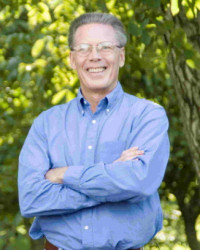 At a time when agricultural lands are at risk of becoming subdivisions and shopping malls, the presentation of the 2007 Leopold Conservation Award to Craig McNamara and his 450-acre walnut farm, Sierra Orchards, affirms the crucial role that California farmers and ranchers play in protecting the environment and restoring wildlife habitat. McNamara and the four finalists for the prestigious award demonstrate both stewardship and prosperity, integrating habitat-conserving practices with the bottom line.
At a time when agricultural lands are at risk of becoming subdivisions and shopping malls, the presentation of the 2007 Leopold Conservation Award to Craig McNamara and his 450-acre walnut farm, Sierra Orchards, affirms the crucial role that California farmers and ranchers play in protecting the environment and restoring wildlife habitat. McNamara and the four finalists for the prestigious award demonstrate both stewardship and prosperity, integrating habitat-conserving practices with the bottom line.
At Sierra Orchards, McNamara utilizes tried-and-true organic farming practices as well as the most recent technological advances. His proactive investment in tailwater ponds, sediment traps and hedgerow plantings helps ensure that no irrigated or natural water is wasted. He hangs more than 40,000 pheromone devices each year to control codling moth pests. He even uses composted table scraps from San Francisco restaurants as fertilizer. Sierra Orchard’s organic walnut production and sales have steadily increased, demonstrating the integral relationship between economic success and sustained conservation.
With an eye toward the future, McNamara has committed himself and Sierra Orchards to helping high school students become lifelong learners, overcome barriers to change, develop leadership skills and build greater human and social capital in their communities. Based at Sierra Orchards, the Center for Land-Based Learning reaches more than 2,000 California students annually to learn about sustainable agriculture firsthand.
With more than half of California’s land in private hands, the day-to-day practices of private landowners – particularly farmers and ranchers working with the land – are crucial to environmental health. Farmers, ranchers and timber producers see that it is in their own long-term best interest to be conservative with their natural resources, and that’s very good news for conservation.
Aldo Leopold wrote, “Conservation is a state of harmony between men and land.” He believed that farmers and ranchers were well suited and situated to understand how to nurture the land that gives so much back to them. His perspective is at least as important today as it was in the 1930s and 1940s. The environmental and health consequences of imprudent farming and ranching have become clearly evident.
Each of the finalists for this year’s Leopold Conservation Award in California provide a living example of agriculture that is as healthy for wildlife as it is for the farmer, and Craig McNamara has shown particularly outstanding leadership.
We recognize that attitudes in California agriculture are changing. Increasingly, farmers and ranchers are finding practical ways to provide habitat for wildlife and clean water for their communities while they sustain a healthy business. They are making choices that are environmentally and economically sound.
In presenting the Leopold Conservation Award to an exemplary California farm family, we hope these success stories will grow and multiply in every corner of the state and across the nation.
By Ashley Boren, Sustainable Conservation Executive Director, and Brent Haglund, Sand County Foundation President.
